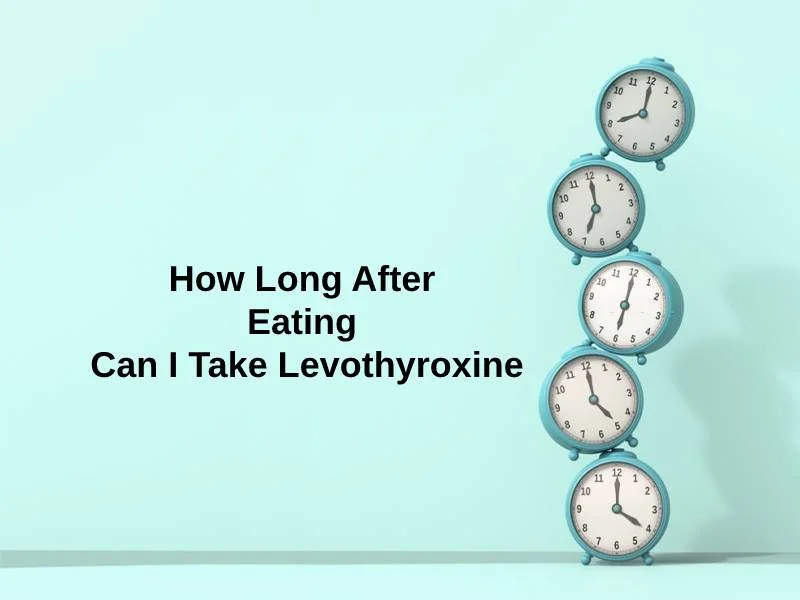Exact Answer: At least 4 hours
Sold under brand names such as Synthroid, Levoxyl, and Unithroid, Levothyroxine is a drug that can only be sold if a prescription is submitted. It is sold in three different types including a capsule that must be taken orally, a tablet that must be taken orally, and a solution that is supposed to be injected.
The drug Levothyroxine is prescribed to treat a condition known as hypothyroidism. This condition takes place when there is an insufficient amount of thyroid hormone that is being produced by the thyroid gland. Also, it can help treat the thyroid gland if it becomes enlarged or swollen. This condition is known as goiter. Also, the drug can help treat few kinds of thyroid cancer.

How Long After Eating Can I Take Levothyroxine?
| Objective | Duration |
| When do you take Levothyroxine before eating? | 30-60 minutes before eating |
| When do you take Levothyroxine after eating? | At least 4 hours |
Levothyroxine is a drug that comes under the family of medications known as hormones. Levothyroxine is a drug that is prescribed to treat conditions such as hypothyroidism, goiter, and thyroid cancer. Because patients might have thyroid glands that do not work properly and do not release enough thyroid hormone, this drug helps release the thyroid hormone that is necessary for the body.
Levothyroxine oral tablets are available in three different dosages: 25 μg, 50 μg, and 100 μg. Depending on each person’s health condition, symptoms, age, and hormone levels, the dosage differs. Typically, doctors prescribe adults with a dosage between 50 μg and 100 μg, only taken one time per day. But this dosage tends to increase to up to 200 μg a day, over the course of several weeks, according to the doctor’s diagnosis.
The thyroid hormone is responsible for controlling growth and levels of energy. So if there is a deficiency in the levels of thyroid hormone, it can severely affect the body and cause undesirable complications.

Thyroid hormone levels may be reduced due to natural complications, or when the thyroid gland is damaged from medication or radiation, or if the thyroid gland itself is removed with surgery.
Levothyroxine must be taken at least thirty minutes to a whole hour before eating. This is why it is best to take this medicine before breakfast. In addition, you may also take Levothyroxine at least four hours after eating. If you do not take Levothyroxine before breakfast, then you will be advised to take the drug 4 hours after dinner. After this, eating food or snacks is strongly frowned upon, as this can affect absorption.
Why Does It Take That Long To Take Levothyroxine After Eating?
You must either take Levothyroxine 30-60 minutes before a meal or 4 hours after eating a meal because this waiting period allows for optimal absorption of the drug into the bloodstream of the patient.
If you eat right after taking Levothyroxine or take Levothyroxine right after eating, it can result in drastically reduced absorption of the drug into the bloodstream.
Waiting 4 hours after a meal to take Levothyroxine also helps prevent fluctuations or sudden changes in the thyroid hormone levels, thus preventing symptoms from reappearing.
Foods such as soybeans, coffee, and those that contain a higher fiber content are major parts of breakfast. In addition, foods that contain more calories, protein, calcium, and fat are also concerning. These types of foods can interfere significantly with the absorption of Levothyroxine into the bloodstream.

Side effects that are common after taking Levothyroxine include weight loss, high appetite, headaches, anxiety, mood swings, fatigue, sensitivity to heat, hyperactivity, irritability, difficulty sleeping, weak muscles, vomiting, stomach cramps, hair loss, tremors, diarrhea, change in the menstrual cycle, and more. Most of these symptoms are temporary and would disappear after a few days or weeks of taking the drug.
But Levothyroxine can have dangerous side effects as well. These include heart attacks, heart failure, abnormal rhythm of heart, and extremely fast heartbeat. In rare cases, you may experience symptoms such as shortness of breath, chest pain, excessive fatigue, swollen limbs, sudden weight gain, and general uneasiness in the upper torso. If you do notice these symptoms, it is important to immediately notify a health professional, as this can very quickly lead to a life-threatening emergency.
Conclusion
This we can understand that one must take Levothyroxine at least 30-60 minutes before a meal, breakfast. In addition, the person must wait at least 4 hours or more after eating, dinner, to take the dosage of Levothyroxine.
It is important to take the drug at the same every day, without fail. This is to avoid and prevent unpleasant and sometimes dangerous side effects and to primarily increase the absorption of the drug into the gut.
Regarding the schedule of intake, dosage, or the form of Levothyroxine that should be taken, one must always consult a doctor or any health professional before consuming.